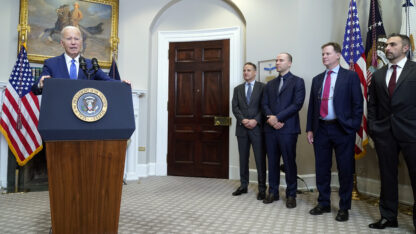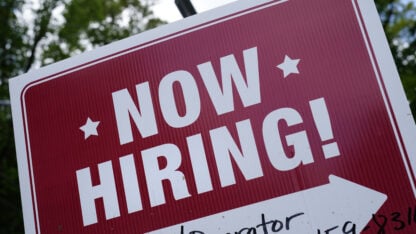More than 20 tech industry leaders will meet Wednesday behind closed doors with U.S. senators as part of a closer look into how Congress can regulate artificial intelligence.
Tesla and X CEO Elon Musk, Meta CEO Mark Zuckerberg and Microsoft founder Bill Gates are among those attending. The leaders of several AI companies, including OpenAI CEO Sam Altman, will also join the discussion.
The gathering is part of a series being led by Senate Majority Leader Chuck Schumer and a bipartisan group of senators in a larger effort to craft groundbreaking AI law. Ahead of the first of his so-called “AI Insight forums,” Schumer argued lawmakers must balance AI innovation in medicine, education and national security against the technology’s risks.
“The only way we’ll achieve this goal is by bringing a diverse group of perspectives together, from those who work every day on these systems, to those openly critical of many parts of AI and who worry about its effects on workers, on racial and gender bias, and more,” Schumer said Tuesday from the Senate floor.
This would be one of the biggest gatherings of top U.S. tech leaders in recent memory, and it follows a series of all-senators AI meetings earlier this year that provided a baseline of information, including a classified briefing. The forums will be broader in subject matter, with more forward-looking discussions on possible legislative paths forward.
Wednesday’s forums will take place in a private Senate meeting room over two different sessions in the morning and the afternoon that will could span two to three hours each. A source familiar with the plans said the more than 20 tech experts are expected to address senators in attendance.
Senators will hear from the leaders of entertainment, labor and civil rights groups, including the head of the Motion Picture Association, the Writers Guild of America West, the American Federation of Teachers and the AFL-CIO.
Other tech leaders who will attend include Google CEO Sundar Pichai and the company’s ex-CEO Eric Schmidt, Microsoft CEO Satya Nadella and IBM CEO Arvind Krishna.
An IBM spokesperson shared a preview of Krishna’s remarks to the senators, which included a push for regulating AI risk but not AI algorithms, making AI creators and deployers accountable, and supporting open AI innovation.
“We should not create a licensing regime for AI,” Krishna is expected to say. “A licensing agreement would inevitably favor large, well-funded incumbents and limit competition.”
Ahead of Wednesday’s meeting, AFL-CIO President Liz Shuler argued that workers must be central to AI policy.
“Public support for unions is at near record highs because workers are tired of being guinea pigs in an AI live experiment,” Shuler said in a statement. “The labor movement knows AI can empower workers and increase prosperity – but only if workers are centered in its creation and the rules that govern it.
“Workers understand how to do our jobs better than any boardroom or algorithm. Bring us in as full partners in this transformation.”
Despite the momentum, Congress faces an uphill battle crafting AI legislation.
Historically, lawmakers have struggled to regulate emerging technologies, from the internet to social media. AI is moving quickly, and Congress has a deficit of experts on AI, leaving many members to learn more about the technology as they simultaneously look to regulate it.
However, Schumer has argued they’re doing the necessary work to catch up. New Mexico Democratic Sen. Martin Heinrich and Republican Sens. Mike Rounds, R-S.D., and Todd Young, R-Ind. are helping lead that charge.
“Congress must recognize two things: that this effort must be bipartisan, and we need outside help if we want to write effective AI policies,” Schumer said Tuesday.
That outside help, Schumer argued, needs to include industry developers, experts, critics and ethicists, and members from the world of academia, defense and more.
“All of these groups, together in one room, talking about why Congress must act, what questions to ask, and how to build a consensus for safe innovation,” Schumer said.
Schumer also faces obstacles from within Congress, with members on both sides of the aisle trying to tackle their own proposals to regulate AI. Multiple congressional committees hold jurisdiction on the issue, and Congress has easily hosted more than a dozen AI hearings with many more to come.
This, as House Republican Speaker Kevin McCarthy has already argued against over-regulation. McCarthy has said there’s no need to create an agency to regulate AI, a popular idea among some Senate Democrats.
Copyright 2023 NPR. To see more, visit https://www.npr.org.
9(MDAxODM0MDY4MDEyMTY4NDA3MzI3YjkzMw004))

9(MDAxODM0MDY4MDEyMTY4NDA3MzI3YjkzMw004))








